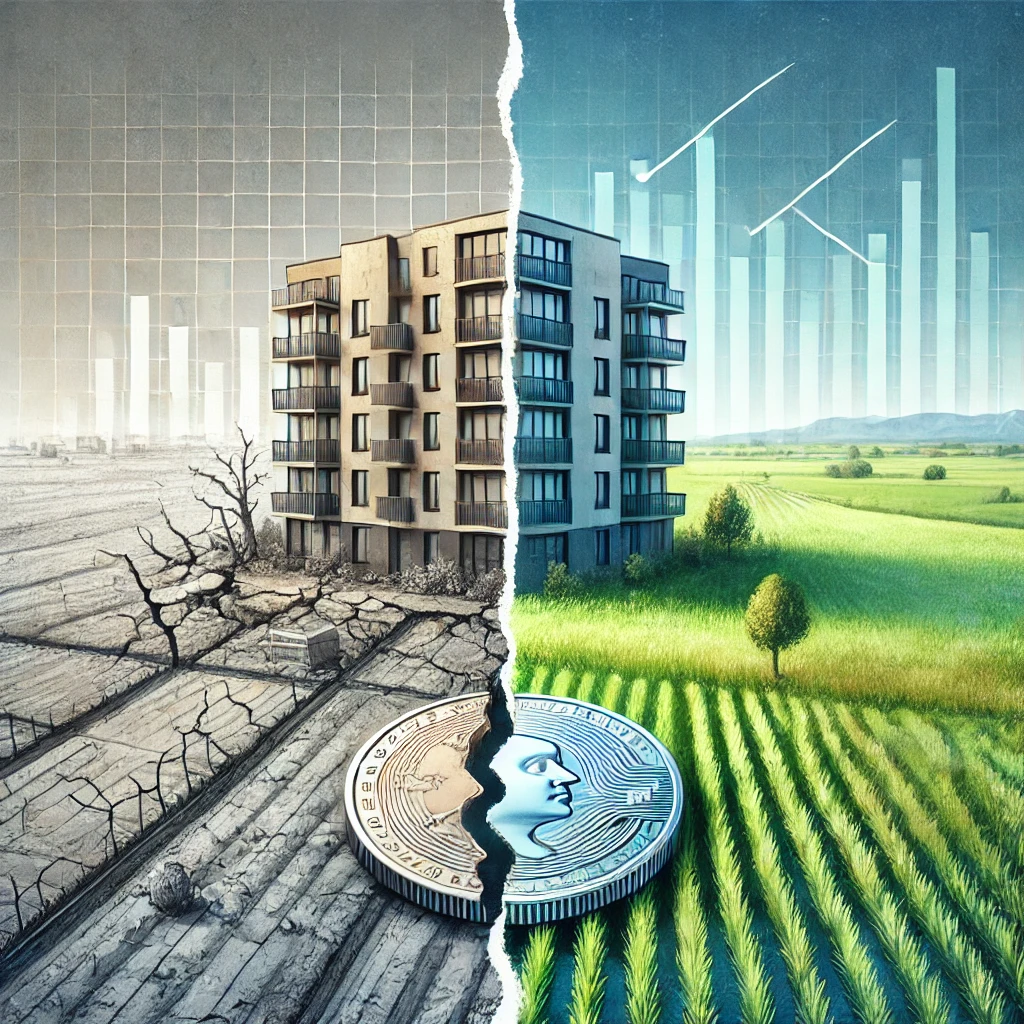Why Investing in a Flat can be a Financial Trap
Buying a flat might seem like a shortcut to financial success, but the reality is often a rude awakening. Developers and agents spin enticing stories about skyrocketing property values and steady rental income. But once the glitter fades, flats can quickly turn into money-draining liabilities that stifle your financial growth. Here’s why investing in a flat might be one of the worst financial decisions you’ll ever make—and why alternatives like land or other investments are a smarter bet for your future.
Post last updated: December 12, 2024

1. Flats Get Old, and So Does Their Value
Land is valuable because there’s only so much of it. Flats, on the other hand, are stuck in buildings that age, decay, and lose their shine. That sleek apartment you’re excited about today could become an outdated, high-maintenance headache in just 15 years. Styles change, infrastructure breaks down, and the "asset" you were counting on can lose value faster than you expect.
2. Maintenance Costs Never Stop
Owning a flat is like being on a treadmill of expenses that never slow down. Monthly fees, repairs, security, and maintenance for amenities like gyms and pools all chip away at your returns. And when a major repair—like fixing the plumbing or upgrading electrical systems—comes out of nowhere, it can leave a huge dent in your wallet. Over time, these costs stack up and turn your "investment" into a financial drain.
3. Your Property, But Not Your Rules
Think you’re in control because you own the flat? Think again. Homeowners’ associations and building committees have the final say. Want to renovate your kitchen or fix a leak urgently? You’ll need to get approvals, and sometimes you’ll end up paying for changes you never agreed to. Plus, if your neighbors don’t care about maintenance, your investment suffers, too.
4. The Rental Income Myth
People say renting out a flat will bring in passive income. But the reality? Rental markets are unpredictable. Tenants come and go, vacancies can last for months, and rental yields are often a disappointing 2-3%. Once you deduct maintenance, taxes, and vacancy periods, your "income" can feel more like a financial burden.
5. Good Luck Selling It Quickly
Flats are tough to sell, especially when you need cash fast. Unlike stocks or bonds, you can’t just offload a flat with a few clicks. There’s paperwork, negotiations, and approvals to deal with. Older flats in overbuilt areas can sit on the market for months—sometimes even years. If you’re counting on quick liquidity, flats won’t deliver.
6. Those Fancy Amenities Won’t Last
That sparkling pool, modern gym, and stylish community hall might have drawn you in, but these amenities age, too. Keeping them in good shape costs money, your money. As they deteriorate, they add less and less value, but you’ll still be paying for their upkeep.
7. Too Many Flats, Too Little Demand
Cities are overflowing with new flats, and developers keep building more. This oversupply means prices stay stagnant or even fall. When there are thousands of similar flats on the market, selling yours at a good price becomes an uphill battle.
8. No Room to Grow
Flats are fixed spaces—you can’t expand them. Need an extra room or more storage? Too bad. Unlike independent houses or land, you’re stuck with what you have.
9. Legal Hassles Galore
Buying a flat can open the door to all kinds of legal issues—unclear ownership titles, delayed construction, or society disputes. What you thought was a simple investment can easily turn into a never-ending legal headache.
10. Recessions Can Crush Flat Prices
Flats are vulnerable to economic downturns. When the market dips, property values drop, and rental demand shrinks. Flats often lose value quickly during tough times, while land and commercial real estate are usually more resilient.
Why Land is the Better Bet
If you’re serious about investing in real estate, land is where you should focus. Here’s why:
- It Appreciates: Land is limited, and as cities expand, its value goes up.
- No Depreciation: Unlike flats, land doesn’t age or wear out.
- Flexibility: Build a home, set up a business, or sell to a developer—you decide.
- Lower Costs: No monthly maintenance fees or surprise repairs.
- Faster Sales: Desirable plots of land are easier to sell and often fetch higher prices.
Consider Smarter Investment Options
Instead of locking your money into a flat, explore these alternatives:
- Commercial Properties: Higher rental yields and more potential for growth.
- Stocks and Mutual Funds: Let your money grow through diverse investments.
- REITs: Enjoy real estate returns without the headaches of ownership.
- Gold: A classic hedge against inflation.
- Government Bonds and FDs: Safe, predictable returns if you’re risk-averse.
Flats: Great for Living, Bad for Investing
Buying a flat to live in? That can make sense. It gives you stability and a place to call home. But if you’re thinking of buying a flat as an investment, you might want to think twice. Between endless costs, low returns, and depreciation, flats can be a financial trap.
Don’t let a bad investment decision hold you back. Choose assets that grow with you, not ones that drag you down.
Have questions or need support? Feel free to reach out to us!
Email: admin@fincalci.com
Author:





